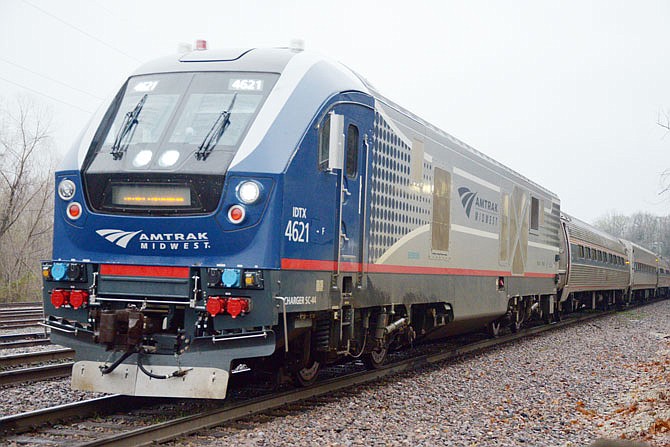Although ridership numbers on Amtrak's Missouri River were down for the second quarter of the fiscal year, Missouri Department of Transportation officials said they were much better than in the first quarter.
From November through February, 25,491 passengers either arrived at or departed out of the Jefferson City station. That compares with 25,197 passengers during the same period in 2018.
So far in the fiscal year, there have been 111,891 passengers on the Missouri River Runner train, about 1,400 less than in 2018.
The top four stations by percentage of ridership continue to be Kansas City, St. Louis, Kirkwood and Jefferson City.
Revenue for November through February was $3.798 million, up from $3.632 million in 2018.
"We were down five percent in the first quarter and only down one percent in the second quarter," said Bryan Ross, MoDOT railroad operations manager. "We had a good winter. Each month, passenger numbers were up. We were down July through October due primarily to low gas prices and work on the tracks, which led to freight train congestion."
Union Pacific owns the tracks, and Amtrak shares them.
Ross said the current fleet of Amtrak passenger cars is going through a refreshment process, including new paint, upholstery and carpeting. Ross said the work will be done by mid-February 2020.
"Amtrak has 80 passenger cars in their Midwest fleet, and Missouri pools with other Midwest states to use those cars," Ross said. "As those cars get refreshed, they cycle into our system."
By the summer of 2020, Ross said, they will get new passenger cars into the Missouri River fleet. Typically, six passenger cars run on the Missouri River Runner.
"Once the cars are manufactured, they have to go through six months of testing before going into service," he said.
Officials said some of the current cars have been around since the 1970s. They believe the ride should be improved with new seats and safety measures. The cars also will have lifts, allowing people in wheelchairs easier access.
Ross said MoDOT completed negotiations with Amtrak for the fiscal year 2019, and a contract was signed. It appears costs will be similar to those for 2018. He also said they are starting to work on a 2020 contract.
Revenue for state fiscal year 2018 was $5,588,595. That's down from $5.9 million in 2017 and $5.6 million in 2016. There was a 5 percent increase in fares in 2018 and 2019.
The state appropriation for Amtrak in 2018 was $9.1 million, after a $500,000 restriction from former Gov. Eric Greitens. MoDOT's 2019 budget request for Amtrak operations was $15.1 million. Ross said the state budget request for fiscal year 2020 is $16.6 million. Since 1979, the sole funding for the two cross-state trains between Kansas City and St. Louis comes from the Legislature and fares.
Ross said they don't have figures on how ridership was affected for the last half of March when the River Runner ran only a few days. The service had to be cancelled due to an increase in freight train traffic which was re-routed onto the Missouri River Union Pacific line after flooding closed many of the rail company's freight lines in northern Missouri, Nebraska and Iowa. Buses took those who had already booked passage on Amtrak to their destinations.
"It will be interesting to see what those numbers show, but we usually have a very solid customer base," Ross said.

